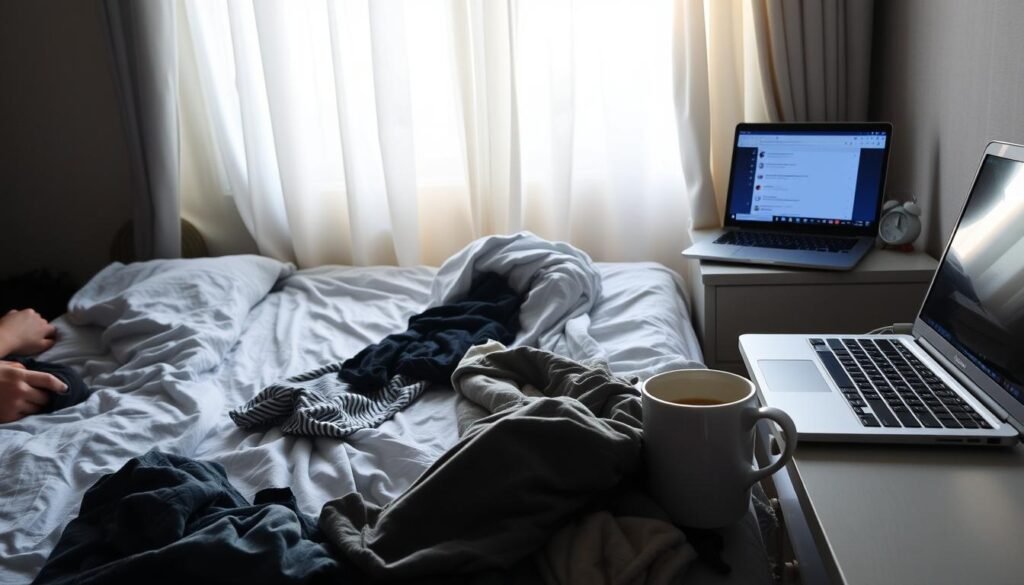Surprisingly, around 68% of Britons often wake up feeling tired. This shows a widespread issue affecting people everywhere. Morning fatigue makes you feel exhausted right after waking up. It can really affect your day. Not sleeping enough, poor sleep quality, and lifestyle habits are big reasons for this problem. By looking into causes like sleep disorders or what you eat, you can figure out why you wake up tired. This knowledge helps fight morning fatigue.
Looking into why we feel this way shows how crucial good sleep is. If you still feel tired after two weeks of trying to fix things, it might be time to see a doctor. They can diagnose the problem and offer treatments. Making healthy changes and following good sleep habits can make mornings better.
For tips on beating morning fatigue, like changing what you eat or trying new treatments, looking for solutions can boost your energy.
Key Takeaways
- Morning fatigue affects a lot of people, leaving many to start their day feeling tired.
- Poor sleep is linked to sleep disorders that can make you feel more tired.
- Your diet and how much you exercise have a big impact on sleep quality.
- Good sleep habits can help you feel more awake in the mornings.
- If you’re still tired, getting checked by a doctor is important.
- Other treatments can also help improve your energy and health.
Understanding Morning Fatigue
Morning fatigue makes waking up hard and affects your day. It’s caused by many things that reduce sleep quality. Feeling tired on waking can mess with your mood and how well you do things. Also, restless sleep, like hitting snooze a lot, can ruin your day.
Not drinking enough water can make you feel tired too. It’s good to drink water right after you wake up. Doing things like morning yoga for just 25 minutes can also help. Yoga boosts your energy and brainpower, making mornings easier.
Taking cold showers can also help by making you less likely to call in sick. Getting sunlight in the morning boosts serotonin, making you feel more awake during the day.
Having a regular sleep schedule helps your body’s clock stay on track. This can make waking up easier. Doing aerobic exercises can also reduce feelings of being tired, as shown in many studies.
Feeling happy and less stressed is important too. Stress and sadness can steal your morning energy. Try to plan fun things to do in the morning to beat this tiredness.
If morning fatigue is a constant problem, you might have a sleep disorder. Conditions like insomnia and sleep apnea greatly affect how well you sleep. For help with morning fatigue, learning about its causes is the first step. You can find more information at morning fatigue.
Common Causes of Waking Up Tired
Many people wake up feeling tired. This often happens because they didn’t sleep enough. Other times, bad habits like irregular sleeping patterns or too much screen time before bed cause it. These things greatly impact the quality of sleep, making you feel drained in the morning.
Sleep disorders are another big reason why you might feel tired after waking up. If you have sleep apnea, your sleep might get interrupted a lot. This makes you feel tired all day. A lot of people with this problem don’t even realize their sleep is being disturbed.
What you do in your everyday life can also affect how well you sleep. If you eat heavy or spicy foods late at night, it could mess up your sleep. Drinking too much caffeine or alcohol does the same thing. They make it harder to get good rest. If you want to find ways to sleep better, you can check this out.
Stress and mental health issues like anxiety or depression can make you feel more tired. They are closely linked to not sleeping well. Knowing this helps us see how important mental well-being is for good sleep. It encourages us to adopt a healthier lifestyle for better sleep habits.
| Factor | Impact on Sleep | Common Solutions |
|---|---|---|
| Inadequate Sleep | Persistent fatigue and low energy | Establish a consistent sleep schedule; reduce screen time |
| Sleep Disorders | Interrupted sleep and poor rest quality | Seek medical advice; consider therapy for disorders |
| Lifestyle Factors | Increased daytime tiredness | Improve diet; limit caffeine and alcohol intake |
| Stress and Mental Health | Difficulty falling asleep; erratic sleep patterns | Practice relaxation techniques; seek therapy |
Why Do I Feel Tired When I Wake Up: Exploring Sleep Disorders
There are many sleep disorders that can make you wake up feeling tired. Conditions like sleep apnea, insomnia, and restless legs syndrome have a big impact. They change how well you sleep and your energy in the daytime.
Sleep Apnea: Understanding the Basics
Sleep apnea means you stop breathing for a bit when you’re sleeping. Your sleep gets broken up because of this. You don’t get enough oxygen, which makes you really tired during the day.
People with sleep apnea who don’t get treatment face serious health problems. These can include heart disease and stroke. Catching the symptoms early can help you find treatments. This improves how you feel in the morning.
Insomnia and Its Impact on Morning Energy
Insomnia makes it hard to fall asleep or stay asleep. It ruins your sleep quality, making you feel tired when you wake up. Stress, anxiety, and some medicines can make insomnia worse. They make it hard to feel alert in the morning.
Learning ways to deal with insomnia can make your mornings better. You’ll wake up feeling more refreshed.
Restless Legs Syndrome and Sleep Disruption
Restless legs syndrome causes feelings that make you want to move your legs. This can mess up your sleep. You might not get enough rest, making you tired in the morning.
Finding out what causes these symptoms and managing them is key. It helps you get a better night’s sleep.
Effects of Inadequate Sleep on Morning Fatigue
Not getting enough sleep greatly influences how tired you feel in the morning. Studies show it might take 15–30 minutes for someone to fully wake up after sleeping. During this period, a person may have less energy and have a hard time focusing, making them feel even more drained.
Lack of sleep can lead to a buildup of a sleep-inducing chemical in the brain called adenosine. This makes you feel more and more tired each morning. Sleep disorders like sleep apnea can make this worse by causing you to wake up many times at night. So, the effects of not sleeping well can make your mornings very tough.
Other things can make you feel tired too. Conditions like restless legs syndrome can ruin your sleep, leaving you feeling very tired the next day. Also, health problems such as anemia or a slow thyroid can make you overly tired. Not resting enough means your body can’t recover well, leaving you feeling tired all the time.
The causes of morning fatigue can be complex, linked to both your lifestyle and health issues. To deal with the effects of not sleeping enough, it’s important to focus on sleeping better and addressing any health problems that affect your sleep.

How Sleep Quality Affects Morning Energy
Knowing how sleep quality impacts morning energy is key to well-being. Good or bad sleep influences how one feels in the morning. Improving sleep hygiene boosts sleep quality and morning energy.
The Importance of Sleep Hygiene
Sleep hygiene involves habits that lead to good sleep. Important habits include:
- Maintaining a consistent sleep schedule, which reinforces circadian rhythms.
- Creating a dark, quiet, and comfortable sleeping environment to promote deeper sleep.
- Avoiding screens and stimulating activities close to bedtime to facilitate relaxation.
These habits reduce morning tiredness. Poor sleep hygiene often leads to sleep deprivation. This can cause troubles with thinking and make people grumpy. For more on sleep and the brain, visit this resource.
Sleep Inertia: The Grogginess After Waking
Sleep inertia is the groggy feeling after waking up. It can last up to 30 minutes, making it hard to feel fully alert. Several factors influence sleep inertia.
| Factor | Impact on Sleep Inertia |
|---|---|
| Duration of Sleep | Shorter sleep durations may intensify feelings of grogginess upon waking. |
| Sleep Stage at Awakening | Waking during deep sleep can exacerbate sleep inertia. |
| Time of Day | Morning awakening often leads to stronger sleep inertia than waking in the afternoon. |
Improving sleep hygiene helps reduce sleep inertia and increases morning energy. By understanding sleep aspects, one can have more energized mornings.
Lifestyle Factors Contributing to Morning Fatigue
Lifestyle choices like diet, exercise, and managing stress greatly affect our morning energy. By looking at our habits in these areas, we see how they shape our sleep. Better choices can lead to deeper sleep and improved well-being.
Impact of Diet on Sleep and Wakefulness
Eating right is key to good sleep. Some foods help us relax, while others might keep us awake. For example, eating too much late at night can cause discomfort and trouble falling asleep. But foods like fatty fish, nuts, and dairy can make our sleep better. Staying hydrated is also important; not drinking enough can make us feel tired and affect our day.
The Institute of Medicine recommends about 91 ounces of water a day for women and about 125 ounces for men.
Importance of Regular Exercise
Regular physical activity is great for sleep. The World Health Organization suggests we get 150 minutes of exercise each week. It helps relieve stress, which in turn can improve how well we sleep. However, it’s best not to do intense workouts right before bed. This can make it hard to sleep.
Stress Management and Its Role in Sleep Quality
Handling stress well is crucial for good sleep. Practices like mindfulness and relaxing before bed can help lessen stress’s impact. Chronic stress affects not just our minds but can also disturb our sleep. By finding ways to manage stress better, we can sleep more soundly and wake up refreshed.

Hormonal Influences on Sleep and Energy Levels
Hormonal influences play a big role in our sleep and energy levels. Many hormones that affect sleep are changed by how much we sleep. This creates a balance that impacts our daily energy. Hormones like cortisol, estrogen, progesterone, melatonin, and thyroid hormones can disrupt sleep. This affects how rested someone feels in the morning.
Our body’s circadian rhythm is key in controlling these hormones. Melatonin increases at night, helping us sleep, while cortisol helps us wake up in the morning. If this rhythm is off, it can make us feel tired all the time and lower our energy.
Not getting enough sleep can mess with hunger hormones like ghrelin and leptin. Less sleep can make us hungrier, leading to eating more calories and possibly gaining weight. To keep hormonal balance, it’s good to:
- Have a regular sleep schedule
- Reduce sugar intake when sleep is bad
- Have a relaxing bedtime routine
Too little sleep increases ghrelin, which makes us hungry, and decreases leptin, which tells us we’re full. This leads to bad eating habits and more weight gain. By sleeping better, we can fix these hormonal issues. This helps us have more energy during the day.
Managing Stress for Better Sleep
Stress management is key to better sleep quality. It also boosts your daily energy. High stress can cause insomnia and other sleep issues. This adds to how tired you feel in the morning. Finding and tackling stress sources helps you sleep better at night.
Adding exercise to your day helps your well-being and lowers stress. Exercise makes you healthier and is a great way to release stress. Eating right, with less sugar, caffeine, and alcohol, helps fight stress. It also leads to better sleep.
Being with family and friends helps manage stress. It gives you emotional support to face life’s challenges. A survey found that 44 percent of adults had stress-related sleep issues in the last month. Changing your thoughts can also help manage stress better.
Doing breathing and muscle relaxation exercises daily can reduce stress. These should be done for 20 to 25 minutes for two weeks. They calm the body’s stress response. This means better sleep by lowering stress hormones like cortisol and adrenaline.

| Stress Management Techniques | Benefits |
|---|---|
| Physical Activity | Reduces stress, improves overall well-being |
| Healthy Diet | Promotes physical health, reduces stress levels |
| Social Support | Provides emotional buffering against stress |
| Thought Management | Alters stress-inducing thought patterns |
| Relaxation Exercises | Enhances sleep quality by lowering stress hormones |
Improving Your Sleep Environment
Making your sleep space better is key to sleeping well. A well-set room can greatly help you rest well. Things like how warm or cool the room is, how much light there is, and noise matter a lot. To make your sleeping area better, think about these tips:
- Maintain a cool, dark, and quiet room to promote a tranquil atmosphere.
- Invest in a comfortable mattress and supportive pillows for optimal comfort.
- Limit exposure to blue light from screens by reducing usage before bedtime.
- Create a relaxing bedtime routine with calming activities to signal the body it’s time to sleep.
- Keep bedroom clutter to a minimum, promoting a serene environment.
Having a regular sleep schedule helps too. It’s good to go to bed and wake up at the same time every day. This habit strengthens your body’s sleep-wake cycle. Experts say adults should get at least seven hours of sleep each night. Anyone having a hard time sleeping often should look for ways to fix it.
Drink plenty of water all day and avoid big meals, caffeine, nicotine, and alcohol right before bed. Getting sunlight in the morning can help you feel lively and fall asleep easier at night. Taking steps to make your sleeping environment better is an active way to beat feeling tired when you wake up.
| Improvement Strategy | Benefits |
|---|---|
| Cool room temperature | Promotes deeper, uninterrupted sleep |
| Darkness | Enhances melatonin production for natural sleep |
| Quiet space | Reduces disturbances, leading to better rest |
| Comfortable bedding | Alleviates discomfort that could disrupt sleep |
| Bedtime routine | Prepares the mind for relaxation and sleep |
These changes create a sleep-friendly setting and lead to a sounder rest at night. With better rest comes more energy during the day. By paying attention to these details, you can solve the common problem of waking up tired.
Conclusion
Understanding how to fight morning fatigue means looking at what affects our sleep and well-being. A lot of teens, 42%, find it hard to wake up, showing this is a widespread issue. Changing our habits, like improving sleep routines, exercising regularly, and handling stress, can help lessen tiredness. Good *sleep quality* is key to beat fatigue, so tweaking our bedtime habits is crucial.
It’s also important to check if sleep or mood disorders are playing a role. For some, waking up can be confusing and hard, especially in the mornings. This is due to sleep inertia, which is worse if we don’t sleep enough or wake up at the wrong time. Seeing a doctor or therapist can help us understand these issues and find the right solutions.
Finally, overcoming morning fatigue is possible when we make informed choices that fit our lives. By focusing on better sleep and lifestyle choices, we can look forward to more vibrant mornings and being more productive during the day. Learning more and finding the right strategies are crucial steps in improving our overall well-being.